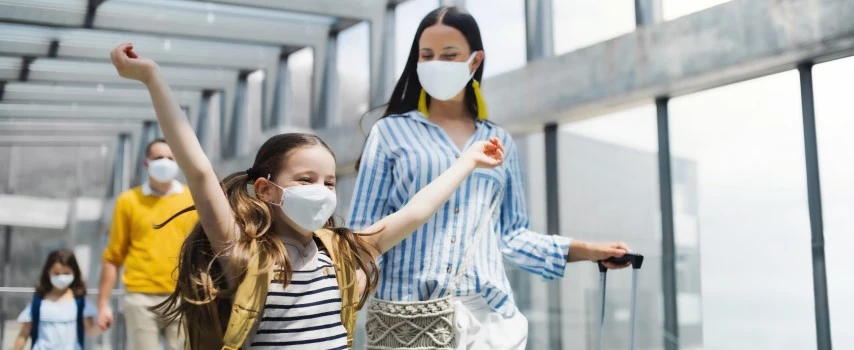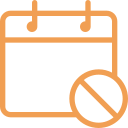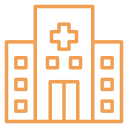COVID-19 travel insurance cover
The below information relates to COVID-19 cover included in policies sold on or after 26 July 2023. For policies purchased prior to this date, please consult the relevant PDS and/or your Policy Wording.
IMPORTANT: Our customer service team cannot provide customers with personal advice over the phone or confirm if a claim will be approved. All claims need to be submitted for consideration via our claims portal.
For general questions related to our Cover-More COVID-19 cover, please read the PDS and/or your Policy Wording, review our COVID-19 FAQs before calling us.

Protect your international or domestic trip with our COVID-19 benefits
Looking for travel insurance with COVID-19 cover for trips within Australia and overseas?
At Cover-More, we provide several COVID-19 travel insurance benefits across our international and domestic plans to help you book and travel with confidence. Yes, this means you can focus on planning your getaway knowing we’re by your side to support you during the coronavirus pandemic.
For more information on our travel insurance with COVID-19 cover, keep reading below or skip ahead to learn:
- What COVID-19 travel insurance cover is
- If Cover-More travel insurance offers cover for COVID
- What Cover-More’s COVID-19 benefits do cover
- What Cover-More’s COVID-19 benefits don’t cover
- What Cover-More international travel insurance plans cover COVID-19
- What Cover-More domestic travel insurance plans cover COVID-19
- Why choose Cover-More travel insurance
You can also read the COVID-19 travel insurance cover FAQs or get a quote online now.
What is COVID-19 travel insurance cover?
A travel insurance policy that includes cover for unforeseen COVID-19-related scenarios can help reduce the financial risk of travelling during the novel coronavirus pandemic. It is common for travel insurance with COVID-19 benefits to include cover for incidents relating to overseas medical expenses, trip amendment or cancellation costs, and additional expenses.
However, policies will vary from provider to provider, so it’s important to understand what you are – and aren’t – covered for when it comes to international and domestic travel insurance with COVID-19 cover when choosing the best travel insurance for you during the current pandemic.
Does Cover-More provide travel insurance with COVID-19 cover?
We have provided some COVID-19 travel insurance cover since December 2020 to help support our Cover-More customers who continued to travel throughout the coronavirus pandemic.
As of 26 July 2023, many COVID-19 travel insurance benefits are still available on all our plans; however, coverage varies between our International Plans and Domestic Plans, and across our three tiers of cover: Basic, Comprehensive, and Comprehensive+.
Before deciding if our travel insurance with COVID-19 cover is right for you, we recommend you read the PDS and compare our International Plans' and Domestic Plans' COVID-19 cover below.
What do Cover-More’s COVID-19 benefits cover?
At Cover-More, our COVID-19 travel insurance benefits help protect you from unforeseen expenses related to the current coronavirus pandemic. These benefits include:

Cover for COVID-19
Overseas Medical Costs*#~

Cover for COVID-19
Amendment or Cancellation Costs*^

Cover for COVID-19-Related
Additional Expenses*#^
What don’t Cover-More’s COVID-19 benefits cover?
Unfortunately, our COVID-19 travel insurance cover can’t protect against absolutely every scenario resulting from the global coronavirus pandemic. To help provide clarity from the get-go, our travel insurance COVID-19 benefits don’t cover the following:
![]()
Government Border Closures, Lockdowns, Self-isolation, or Quarantine
![]()
Mandated COVID-19 Tests (PCRs and Rapid Antigen Tests)
![]()
Close Contacts of a Person Diagnosed with COVID-19
![]()
Cruise Cabin Confinement Costs Related to COVID-19
To ensure you understand the COVID-19 scenarios you aren’t covered for – plus more details on any general exclusions beyond our COVID-19 travel insurance benefits – we encourage you to read the PDS.
Ready to travel? To understand the latest information on COVID-19 and government travel restrictions when planning your trip, please visit smartraveller.gov.au or the relevant Australian State or Territory Government website before getting a quote online.
Important reminder: No travel insurance cover for COVID-19 is provided if you enter a country with an active “Do not travel” warning from the Australian Government if the reason (or one of the) reason(s) for the advice was the presence of COVID-19 or if you do not follow travel advice or warnings published in the mass media. To find out the current overall advice rating of your intended destination, visit Smartraveller’s destinations page.
What COVID-19 cover do Cover-More’s international travel insurance plans provide?
If you’re wanting to find the best COVID-19 travel insurance cover for your overseas trip, we can help. At Cover-More, we offer three tiers of international travel insurance with COVID-19 cover to assist you in finding the right cover for your trip, travel style and budget.
You can compare all the benefits of our International Plans here or compare our international Cover-More COVID-19 cover below:
| International Basic (Single Trip) | International Comprehensive (Single Trip or Annual Multi-Trip) | International Comprehensive+ (Single Trip or Annual Multi-Trip) |
|---|---|---|
| PRE-DEPARTURE: Amendment or Cancellation Costs cover if you or your travelling companion are diagnosed with COVID-19 and certified by a qualified medical practitioner as being not fit to travel. | ||
| ✘ | ✔ Up to $5,000 per policy (or the amount chosen if this is less) if Amendment or Cancellation Costs cover is included in your policy. | ✔ Up to $5,000 per policy (or the amount chosen if this is less) if Amendment or Cancellation Costs cover is included in your policy. |
| PRE-DEPARTURE or ON-TRIP: Amendment or Cancellation Costs cover if your non-travelling relative or business partner residing in Australia or New Zealand becomes ill with a life-threatening case of COVID-19. | ||
| ✔ Up to $5,000 per policy (or the amount chosen if this is less) if Amendment or Cancellation Costs cover is included in your policy. | ✔ Up to $5,000 per policy (or the amount chosen if this is less) if Amendment or Cancellation Costs cover is included in your policy. | ✔ Up to $5,000 per policy (or the amount chosen if this is less) if Amendment or Cancellation Costs cover is included in your policy. |
| PRE-DEPARTURE or ON-TRIP: Amendment or Cancellation Costs cover if you are an essential healthcare worker and have your leave revoked because of COVID-19-related reasons. | ||
| ✔ Up to $5,000 per policy (or the amount chosen if this is less) if Amendment or Cancellation Costs cover is included in your policy. | ✔ Up to $5,000 per policy (or the amount chosen if this is less) if Amendment or Cancellation Costs cover is included in your policy. | ✔ Up to $5,000 per policy (or the amount chosen if this is less) if Amendment or Cancellation Costs cover is included in your policy. |
| ON-TRIP: Overseas Medical Expenses cover if you are diagnosed with COVID-19 on your trip and certified by a qualified medical practitioner as being not fit to travel (including onboard emergency medical and ship-to-shore medical expenses on a multi-night cruise if Cruise Cover is included in your policy). | ||
| ✔ $Unlimited~ | ✔ $Unlimited~ | ✔ $Unlimited~ |
| ON-TRIP: Amendment or Cancellation Costs cover if you or your travelling companion are diagnosed with COVID-19 on your trip and certified by a qualified medical practitioner as being not fit to travel. | ||
| ✔ Up to $5,000 per policy (or the amount chosen if this is less) if Amendment or Cancellation Costs cover is included in your policy. A special excess of $500 applies^. | ✔ Up to $5,000 per policy (or the amount chosen if this is less) if Amendment or Cancellation Costs cover is included in your policy. A special excess of $500 applies^. | ✔ Up to $5,000 per policy (or the amount chosen if this is less) if Amendment or Cancellation Costs cover is included in your policy. A special excess of $500 applies^. |
| ON-TRIP: Additional Expenses cover if you are diagnosed with COVID-19 on your trip and certified by a qualified medical practitioner as being not fit to travel and you incur additional transport and/or accommodation expenses. | ||
| ✔ $2,500 A special excess of $250 applies^. | ✔ $2,500 A special excess of $250 applies^. | ✔ $2,500 A special excess of $250 applies^. |
~Medical cover will not exceed 12 months from onset.
Please note: If the amount of Amendment or Cancellation Costs cover shown on your Certificate of Insurance is less than the maximum limit listed above, the Amendment or Cancellation Costs amount shown on your Certificate of Insurance will be the maximum cover available.
For full details on our international COVID-19 travel insurance cover, please read the PDS.
Ready to cover your overseas trip? You can get a quote online now.
Tip: Want protection against unforeseen COVID-19 scenarios both before and during your international holiday? Consider purchasing our International Comprehensive Plan or Comprehensive+ Plan with Amendment or Cancellation Costs cover included as soon as you book any part of your trip to benefit from pre-trip protection.
What COVID-19 cover do Cover-More’s domestic travel insurance plans provide?
If you want to protect your Australian trip with domestic travel insurance with COVID-19 cover, we can help provide extra peace of mind. Whether you’re planning a city break in one of our beautiful major cities or planning a relaxing escape to the countryside, our travel insurance could help prevent unforeseen expenses from ruining your trip.
You can compare all the benefits included in our Domestic Plans here or view the tables below to compare our domestic travel insurance COVID-19 cover for Australian trips:
| Domestic Basic (Single Trip) | Domestic Comprehensive (Single Trip or Annual Multi-Trip) | Domestic Comprehensive+ (Single Trip or Annual Multi-Trip) |
|---|---|---|
| PRE-DEPARTURE: Amendment or Cancellation Costs cover if you or your travelling companion are diagnosed with COVID-19 and certified by a qualified medical practitioner as being not fit to travel. | ||
| ✘ | ✔ Up to $2,500 per policy (or the amount chosen if this is less) if Amendment or Cancellation Costs cover is included in your policy. | ✔ Up to $2,500 per policy (or the amount chosen if this is less) if Amendment or Cancellation Costs cover is included in your policy. |
| PRE-DEPARTURE or ON-TRIP: Amendment or Cancellation Costs cover if your non-travelling relative or business partner residing in Australia or New Zealand becomes ill with a life-threatening case of COVID-19. | ||
| ✔ Up to $2,500 per policy (or the amount chosen if this is less) if Amendment or Cancellation Costs cover is included in your policy. | ✔ Up to $2,500 per policy (or the amount chosen if this is less) if Amendment or Cancellation Costs cover is included in your policy. | ✔ Up to $2,500 per policy (or the amount chosen if this is less) if Amendment or Cancellation Costs cover is included in your policy. |
| PRE-DEPARTURE or ON-TRIP: Amendment or Cancellation Costs cover if you are an essential healthcare worker and have your leave revoked because of COVID-19-related reasons. | ||
| ✔ Up to $2,500 per policy (or the amount chosen if this is less) if Amendment or Cancellation Costs cover is included in your policy. | ✔ Up to $2,500 per policy (or the amount chosen if this is less) if Amendment or Cancellation Costs cover is included in your policy. | ✔ Up to $2,500 per policy (or the amount chosen if this is less) if Amendment or Cancellation Costs cover is included in your policy. |
| ON-TRIP: Domestic Medical Expenses cover if you are diagnosed with COVID-19 in Australia. | ||
| ✘ | ✘ | ✘ |
| ON-TRIP: Amendment or Cancellation Costs cover if you or your travelling companion are diagnosed with COVID-19 on your trip and certified by a qualified medical practitioner as being not fit to travel. | ||
| ✔ Up to $2,500 per policy (or the amount chosen if this is less) if Amendment or Cancellation Costs cover is included in your policy. A special excess of $250 applies^. | ✔ Up to $2,500 per policy (or the amount chosen if this is less) if Amendment or Cancellation Costs cover is included in your policy. A special excess of $250 applies^. | ✔ Up to $2,500 per policy (or the amount chosen if this is less) if Amendment or Cancellation Costs cover is included in your policy. A special excess of $250 applies^. |
| ON-TRIP: Additional Expenses cover if you are diagnosed with COVID-19 on your trip and certified by a qualified medical practitioner as being not fit to travel and you incur additional transport and/or accommodation expenses. | ||
| ✔ $2,500 A special excess of $250 applies^. | ✔ $2,500 A special excess of $250 applies^. | ✔ $2,500 A special excess of $250 applies^. |
Please note: If the amount of Amendment or Cancellation Costs cover shown on your Certificate of Insurance is less than the maximum limit listed above, the Amendment or Cancellation Costs amount shown on your Certificate of Insurance will be the maximum cover available.
To understand more about our domestic COVID-19 travel insurance cover for Australian residents, please read the PDS. If you’ve got questions about our domestic cover – including why we can’t cover medical costs in Australia – check out our domestic plans page.
If you’re a non-Australia resident looking to protect your trip to Australia, our Inbound Plan may be suitable for you. To find out more, read our Inbound Plan page and consult the PDS for details on our Inbound COVID-19 benefits.
Ready to cover your Australian trip? You can generate a quote online now.
Tip: Looking to protect your Australian trip from unexpected COVID-19 events that occur before you leave home? Consider purchasing our Domestic Comprehensive Plan or Comprehensive+ Plan with Amendment or Cancellation Costs cover included as soon as you book any part of your trip to benefit from pre-trip protection.
Why should I choose to travel with Cover-More travel insurance?
You can trust our Cover-More team to support you with more than COVID-19 travel insurance benefits. Our customers choose to travel with us by their side because we provide:
…and more. To learn more about us and our cover, visit our Cover-More Australia About Us page and read about our most popular benefits here.
FAQs about our Cover-More COVID-19 travel insurance cover
Good news: we’ve answered common questions about our Cover-More COVID-19 cover over on our COVID-19 FAQs page.
If you can’t find the answer to your general question on this page, you can call our friendly team on 1300 72 88 22 or speak with them via Live Chat during Australian business hours.
Eager to travel again?
Find out how much it costs to protect your international or domestic trip with our travel insurance.
*Limits, sub-limits, conditions, and exclusions apply. For full details on exactly what’s covered by our COVID-19 travel insurance benefits, please read our Product Disclosure Statement (PDS) document.
~Medical cover will not exceed 12 months from onset.
#Cover for medical costs related to COVID-19 is not available on our Domestic Plans.
^A special excess will apply to COVID-19 claims under the Amendment or Cancellation and Additional Expenses sections of the policy. If you make a claim that falls under both sections, the higher special excess will be deducted. The special excess applies in addition to any other applicable excess. You cannot remove this special excess.
The information contained on this page is indicative and for illustrative purposes only to help provide information regarding likely coverage under the relevant terms and conditions of a policy. The information relates to policies sold on or after 26 July 2023, is correct at the time of writing on 20 June 2023, and may change at any time, so be sure to check here regularly for updates. For definitive confirmation for your situation, you will need to submit a claim for consideration via our online claims portal.

